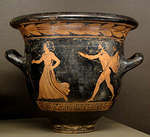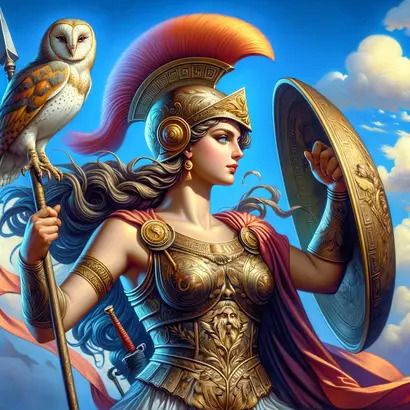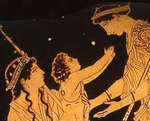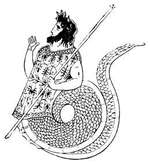
Herse
Herse :: The Enchanting Daughter of Cecrops in Greek Mythology
Herse: The Enchanting Daughter of Cecrops in Greek Mythology
The Birth and Family of Herse
Herse, an intriguing figure in Greek mythology, was one of the three daughters of Cecrops, the mythical founder and first king of Athens. Alongside her sisters, Aglaurus and Pandrosus, Herse played a significant role in the early history of Athens and the legends surrounding the city's divine connections.
Herse and the Tale of the Sacred Basket
In the well-known story of the sacred basket, Herse, along with her sisters, was entrusted by the goddess Athena with a basket containing the serpent-formed child Erichthonius. Athena instructed the sisters not to open the basket until her return. Despite the goddess's command, Herse and Aglaurus were overcome by curiosity and peeked inside. Upon seeing the serpent-child, they were driven mad and ultimately leaped from the Acropolis to their deaths.
Herse and Hermes
In another myth, Herse became the object of desire for the god Hermes, who was captivated by her beauty. As Hermes sought to court Herse, her sister Aglaurus, envious of the attention she received, attempted to prevent the god from entering their home. As punishment for her jealousy and interference, Hermes turned Aglaurus into stone, leaving Herse's fate uncertain.
The Legacy of Herse in Greek Mythology
Herse's story in Greek mythology highlights themes of divine intervention, human curiosity, and the complexities of family relationships. As the sister who succumbed to curiosity in the tale of the sacred basket and the object of desire for Hermes, Herse serves as a captivating figure in the rich tapestry of Greek myths and legends. Her story continues to enchant those interested in the ancient world and the enduring tales of Greek mythology.
See Also: Cecrops, Erichthonius, Athena, Hephaestus
Herse Video
Herse Q&A
Herse Associations
Link/Cite Herse Page
Written by: The Editors of GreekMythology.com. GreekMythology.com editors write, review and revise subject areas in which they have extensive knowledge based on their working experience or advanced studies.
For MLA style citation use: GreekMythology.com, The Editors of Website. "Herse". GreekMythology.com Website, 30 Nov. 2023, https://www.greekmythology.com/Myths/Mortals/Herse/herse.html. Accessed 26 April 2024.




